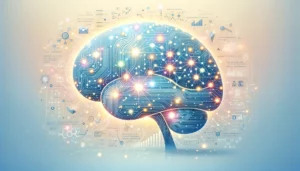Would you like to get notifications from Christian?
Artificial intelligence (AI) is revolutionizing the business world, and its impact on future trends cannot be underestimated. AI refers to developing computer systems that can perform tasks that typically require human intelligence, such as speech recognition, decision-making, and problem-solving. These systems are designed to learn from experience, adapt to new information, and improve performance over time. The potential applications of AI in business are vast, ranging from customer service chatbots and personalized marketing algorithms to predictive analytics and supply chain optimization. As businesses strive to stay competitive in a rapidly changing landscape, understanding the fundamentals of AI and its potential benefits is crucial for success.

Understanding the impact of AI on business trends is essential for staying ahead in today's rapidly evolving market. Artificial Intelligence has the potential to revolutionize various aspects of business, from customer service and marketing to supply chain management and decision-making processes. With AI, businesses can analyze vast amounts of data in real-time, enabling them to make informed and strategic decisions. AI-powered chatbots and virtual assistants can enhance customer experiences and streamline operations. At the same time, machine learning algorithms can identify patterns and trends, helping businesses identify new opportunities and optimize their processes. As AI continues to advance, it will undoubtedly shape the future of business, making it crucial for organizations to embrace this technology and adapt their strategies accordingly.
AI and automation are revolutionizing the modern workplace and shaping future business trends. With the ability to analyze large amounts of data quickly and accurately, AI systems can streamline processes, improve efficiency, and enhance decision-making. Conversely, automation eliminates repetitive and mundane tasks, allowing employees to focus on more strategic and creative work. AI and automation are transforming industries, enabling businesses to become more agile, adaptive, and competitive in an increasingly digital and interconnected world. As an expert in this field, I will explore the various ways AI and automation are being implemented and their potential impact on the future of work.
Artificial Intelligence (AI) is vital in enhancing the customer experience and shaping future business trends. By leveraging AI technologies, businesses can analyze vast amounts of customer data in real-time, enabling them to understand their customers' preferences and needs more deeply. This allows for personalized and targeted interactions, improving customer satisfaction and loyalty. AI-powered chatbots and virtual assistants also provide instant and accurate responses to customer inquiries, enhancing the overall customer experience. Furthermore, AI can predict customer behavior and optimize marketing strategies, ensuring businesses stay ahead of the competition. As AI continues to advance, its impact on customer experience and business trends is only expected to grow, making it an indispensable tool for businesses in the future.
AI-driven data analysis and decision-making are pivotal in shaping future business trends. With the advancements in artificial intelligence, businesses can now harness the power of data to gain valuable insights and make informed decisions. AI algorithms can analyze large volumes of data quickly and accurately, identifying patterns, trends, and correlations that human analysts may miss. This enables businesses to optimize operations, enhance customer experiences, and identify new growth opportunities. By leveraging AI-driven data analysis and decision-making, businesses can stay ahead of the competition and adapt to the ever-evolving market landscape.
AI, or artificial intelligence, is revolutionizing businesses' operations by improving efficiency and productivity. With AI, companies can automate repetitive tasks, analyze vast amounts of data, and make data-driven decisions in real-time. AI-powered systems can streamline processes, reduce errors, and free up employees to focus on more strategic and creative tasks. Additionally, AI can assist in predictive analytics, enabling businesses to anticipate customer needs and optimize their operations accordingly. As businesses strive to stay competitive in the digital age, adopting AI technologies is becoming increasingly crucial. By harnessing the power of AI, companies can enhance their productivity, drive innovation, and stay ahead of the curve in future business trends.
Implementing artificial intelligence (AI) in future business trends brings exciting opportunities, but it also comes with potential challenges and concerns. One of the main concerns is the ethical use of AI, as it raises questions about privacy, bias, and job displacement. Additionally, the complexity of AI algorithms and the need for large amounts of data pose challenges regarding transparency and accountability. However, by addressing these concerns and developing robust regulations and guidelines, we can harness the power of AI to drive innovation, improve efficiency, and create new business models that benefit both organizations and society.
AI's influence on job roles and the future of work is a topic of great importance in today's rapidly evolving business landscape. Artificial intelligence has the potential to revolutionize various industries, leading to significant changes in job roles and responsibilities. While some fear that AI will replace human workers, the reality is that it will likely transform job roles rather than eliminate them. AI can automate repetitive and mundane tasks, allowing employees to focus on more strategic and creative aspects of their work. It also can create new job opportunities in fields such as data analysis, machine learning, and AI programming. Understanding the impact of AI on job roles is crucial for businesses to adapt and thrive in the future.
Artificial Intelligence (AI) is revolutionizing various industries and sectors, paving the way for future business trends. One of the sectors benefitting greatly from AI adoption is healthcare. With AI-powered algorithms and machine learning, healthcare providers can analyze vast amounts of medical data to diagnose diseases, identify patterns, and recommend personalized treatments. Another sector that is harnessing the power of AI is finance. AI algorithms can analyze market trends, predict stock prices, and automate investment decisions, making financial trading more efficient and accurate. Additionally, AI is transforming the transportation industry, with self-driving cars and intelligent traffic systems improving road safety and reducing congestion. As AI continues to advance, it is expected to profoundly impact various other industries, such as manufacturing, retail, and customer service, revolutionizing how businesses operate and creating new opportunities for growth and innovation.
The future of AI in business trends is promising and exciting. As we continue to advance in technology, artificial intelligence is expected to play a vital role in transforming how businesses operate. AI has the potential to automate repetitive tasks, improve decision-making processes, and enhance customer experiences. With the ability to analyze and learn from vast amounts of data, AI can provide valuable insights and predictions, helping businesses stay ahead of the competition. However, it is essential to note that AI can bring numerous benefits. It also raises ethical concerns and challenges that must be addressed. As we progress, businesses must embrace AI responsibly and ethically, ensuring its integration aligns with their core values and goals. The future of AI in business trends holds immense potential for growth and innovation, and it is up to businesses to leverage this technology effectively and responsibly.
Author: Christian Kromme
First Appeared On: Disruptive Inspiration Daily
Do you want more of this kind of content? Subscribe to my 'Disruptive Inspiration Daily' newsletter. Do you find this content inspiring? Give it a 'like' or share the article with your network. This will help you and your network have a relevant timeline.
Which keynote best fits your needs?


Christian is a futurist and trendwatcher who speaks about the impact of exponential technologies like AI on organizations, people, and talents. Christian tailors his presentations to your audience's specific industries and needs.



Our world is changing at an exponential rate! A big tidal wave of digital transformation and disruption is coming at us fast. Many organizations see this wave as a threat and experience stress, but there are also organizations that just see this wave as an opportunity.

Imagine sitting with just 10-15 fellow executives at a premier location, gaining clarity on the impact of AI on your industry while enjoying an exquisite dining experience. These are not just meetings—they are transformative moments that will shape the future of your organization



In the future, 3D printing and generative design will allow for products to be designed in a more decentralized manner, and production will take place closer to the customer and fully on-demand. 3D printing technology will also allow for more customization and personalization of products.


The agricultural industry is ripe for disruption. Robotics, AI, and IoT are all technologies that have the potential to radically transform the way we grow food. In combination with vertical farming, these technologies could increase the efficiency and quality of agricultural products.

A human-centered society is one that puts people first and where technology is used to unite and empower people. It is a society that values biological life and dignity above all else. It is a society that recognizes the importance of human relationships and works to strengthen them. In a human-centered society, all members of the community are valued and treated with respect.


The future of healthcare is here. New technologies like AI, IoT, big data, and smart sensors make it possible to become the CEO of your own health. Imagine that your phone can listen to your voice and AI algorithms can detect small nuances in the tone of your voice that indicate specific diseases.
